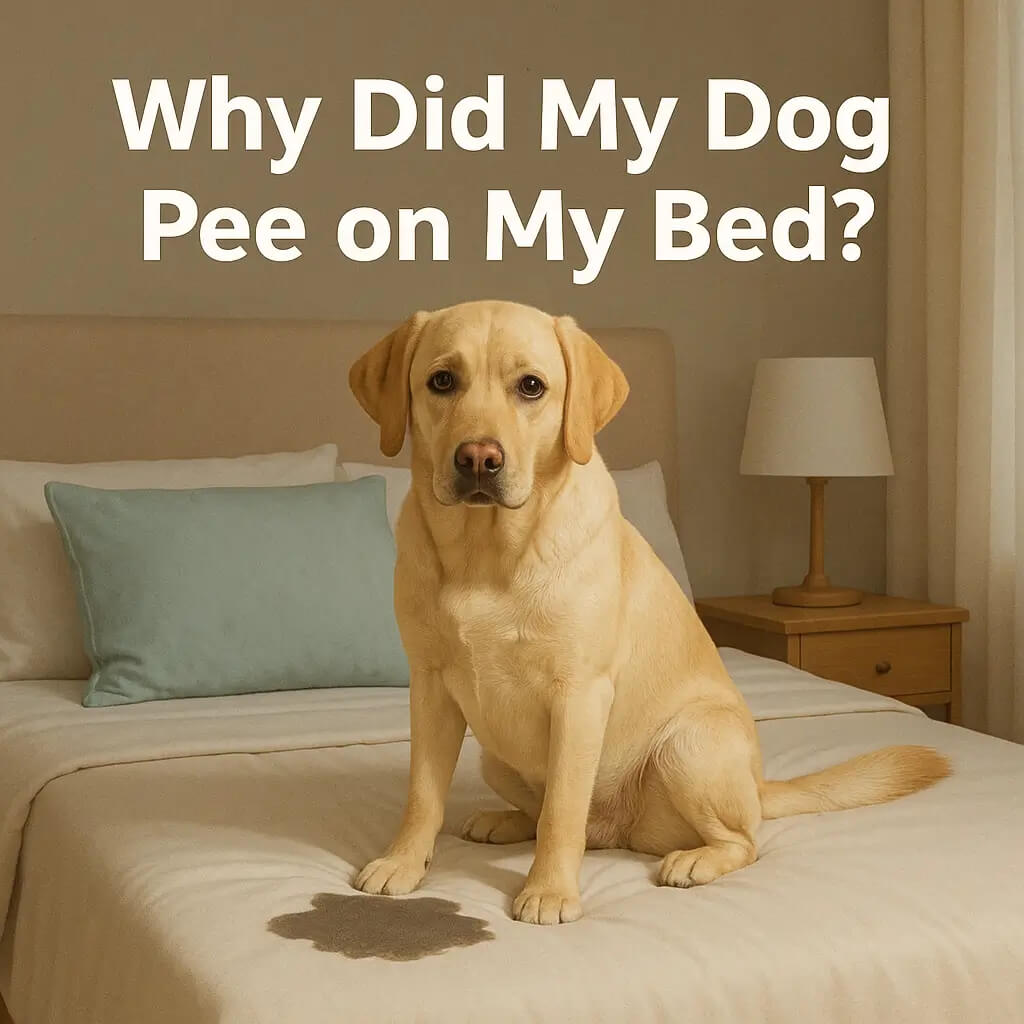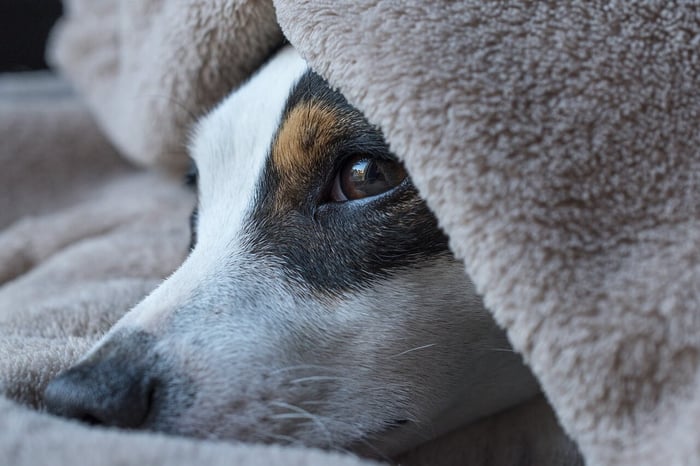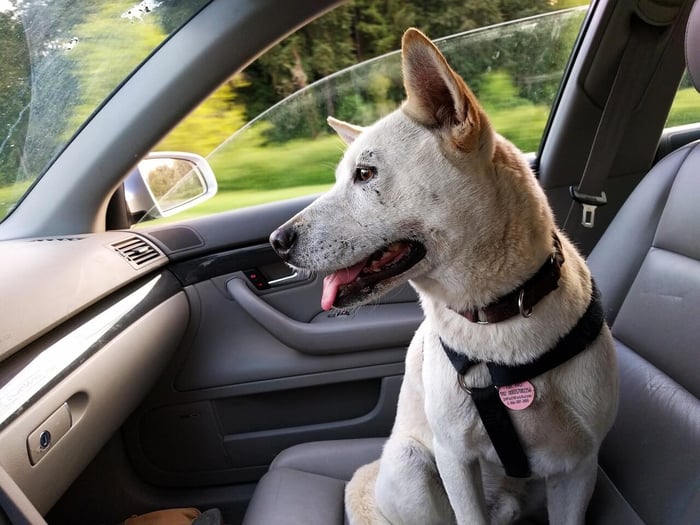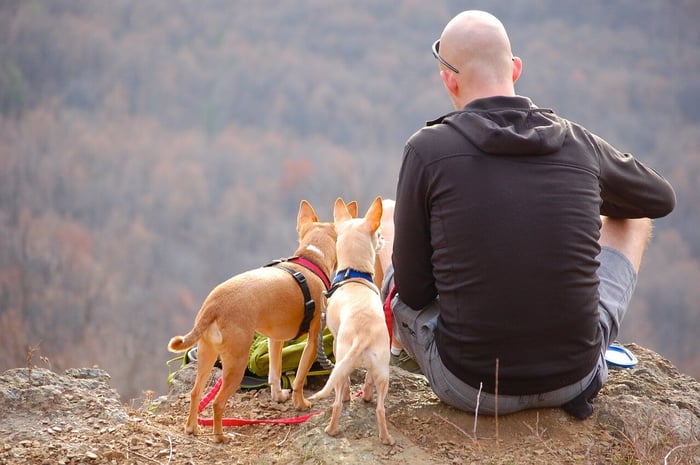In all of our thoughts about giving our dogs enough exercise, we often forget about another of their needs: sleep! While sleep disorders are uncommon in dogs, they can be detrimental to their health.
Look for warning signs of sleep disorders in your dog such as difficulty sleeping, falling asleep suddenly during activities (narcolepsy), or sleepwalking. Make sure your dog is sleeping enough for their age–puppies need up to 20 hours of sleep a day, while adult dogs require around 8-14 hours.
In this article, we’ll discuss how to know if your dog has sleep disorders, how to fix sleep problems, and more.

Identifying Sleep Issues in Dogs
- Narcolepsy
Narcolepsy causes dogs to fall asleep suddenly, even during activities. You might notice your dog collapse seemingly out of nowhere, only to wake up and appear fine.
Other times, you may notice your dog whimpering and twitching with abnormal eye movements. An episode like this can last up to a half hour.
It’s most often seen in young dogs but can occur at any age. It’s hereditary, meaning that dogs whose parents had narcolepsy are more likely to develop it themselves. Overweight dogs seem to be more at risk than those of a healthy weight.
If you notice symptoms of narcolepsy in your dog, please bring them to an emergency vet clinic right away. Your vet will work to rule out other health problems such as liver failure, anemia, or a bladder infection. These symptoms can be linked to several serious ailments!
As for narcolepsy, dogs can live normal lifespans with this disease. It is non-painful and rarely fatal.
- Insomnia
Insomnia is typically a symptom of either stress or an underlying illness. The illness could be mental, such as anxiety, or physical, such as arthritis. There are many causes of insomnia that range in severity.
While insomnia on its own isn’t a medical emergency, you should make an appointment with your primary vet if you notice your dog sleeping less than usual, struggling to fall asleep, or struggling to stay asleep.
- Sleep Apnea
Sleep apnea occurs when a dog struggles to breathe in their sleep or even stops breathing entirely for around 15-20 seconds. They may snore, gasp, choke, or breathe through their mouths.
Some dogs will try to compensate for sleep apnea by sleeping in positions that make breathing easier. Many dogs are tired throughout the day due to disturbed sleep.
Sleep apnea is most common in short-muzzled breeds, as these dogs often struggle to breathe even while awake. It’s rare in dogs with healthy snout lengths.
Other risk factors include obesity, airway obstructions, and allergies. Sleep apnea is treatable and may include a weight loss plan for chubby dogs or surgical correction for short-snouted pups.
- REM Sleep Behavior Disorder
You’ve likely heard of the REM (rapid eye movement) stage of sleep before. This is the time when most dreams occur. Most dogs won’t move much during this time since their muscles are temporarily paralyzed while they sleep, though some amount of movement and vocalization can be normal.
REM sleep behavior disorder occurs when the muscles are not paralyzed, which causes a dog to move in their sleep, sometimes in ways that are violent or scary to witness.
Your dog may kick their legs frantically, make sounds such as barking or growling, or even bite. They don’t know what they’re doing since they’re asleep–think of it like a person sleepwalking.
Most dogs develop REM sleep behavior disorder while they’re young and cannot be cured. Treatment involves managing your dog to ensure they and those around them stay safe despite their sudden movements, and decreasing stress in their environment.
If there is an underlying disease causing the disorder, your vet may be able to treat it and cure the disorder–but this isn’t common.
Causes of Sleep Problems in Dogs
In addition to sleep disorders, changes in sleep can indicate other health problems. Please see your veterinarian if your dog is sleeping more or less than usual, as subtle changes like this are often the first signs of illness.
Pain, diabetes, kidney problems, and more can cause your dog to sleep less than usual. Dementia can cause older dogs to sleep at odd times, sleep less, or even sleep more than is normal. Other causes of a dog sleeping too much include pain, parvovirus, and depression–just to name a few.
Dogs who lose sleep due to illness may see their ailment worsen since sleep is important to healing, cognitive functioning, and overall health.
Of course, your dog seeming to sleep more or less than they used to can be age-related as well. During the transition from puppyhood to adulthood, you’ll see a decrease in sleep. From adulthood to the senior years, you’ll see an increase.
Anxiety can also cause poor sleep, whether your dog is temporarily anxious about something in their environment or has an anxiety disorder.
How Breed Affects Sleep
We know that breed affects a dog’s sleep, but there’s still a lot more to learn in this area of research. Not much has been studied at this time.
Working breeds like Siberian Huskies tend to sleep less than dogs bred primarily for companionship, such as Yorkshire Terriers.
Brachycephalic (short-snouted) breeds such as French Bulldogs and Boxers are more likely to have breathing difficulties in their sleep.
Lastly, larger dogs like Labrador Retrievers seem to sleep more than smaller dogs like Dachshunds.
However, we also know that each dog is an individual, and many factors determine the length and quality of their sleep, including their age and health.

Tips to Solve and Prevent Issues
See a Veterinarian
The first step to solving your dog’s sleep problems or disorder is to see your veterinarian. Only once you’ve ruled out medical issues should you look toward behavioral solutions.
Your veterinarian may run diagnostic tests or prescribe treatments such as medications to treat underlying conditions and help your dog sleep better.
Change their Environment
Another thing you’ll want to do is decrease your dog’s stress levels. Keep your home calm and make sure your dog has somewhere to go where they won’t be disturbed, like a crate in a quiet area of the house. Don’t allow children or other pets to bother them in this space.
Setting up a good sleep area is also important. A soft, cozy dog bed or two will give your pup comfy places to curl up. You might consider playing soft classical music or white noise to block out sounds from outside or noisier areas of the house.
High-energy dogs may need help learning how to settle down and nap throughout the day.
If your dog is experiencing pain from arthritis or another condition, an orthopedic dog bed might be more comfortable for them.
Stick to a Consistent Routine
Dogs thrive on routine and can become confused without it. To the best of your ability, keep your dog’s schedule consistent.
This means feeding and exercising them at the same time each day, and keeping your work and sleeping routine as consistent as you can.
Make sure that your dog is getting enough exercise and mental enrichment throughout the day so that they’re ready to sleep at bedtime. If your dog is bored and sleeps through the day, they might not sleep at night. If they don’t get enough exercise, they may grow restless and find it difficult to sleep at all!
When to Get Help from a Veterinarian
If your dog shows symptoms of narcolepsy such as sudden collapse, please bring them immediately to an emergency vet clinic.
Otherwise, sleep disorders typically aren’t emergent–but your dog should still have an appointment scheduled with their veterinarian whenever changes to their sleep occur.
As you wait for your appointment, observe your dog for other symptoms or changes in behavior. Bring everything you see up to your veterinarian for the best diagnosis.
While changes in sleep can sometimes be normal, they’re typically indicative of a deeper problem that must be addressed either medically or at home. For instance, a stressful environment can make it difficult for your dog to get the sleep they need.
Conclusion
When you notice changes to your dog’s sleep schedule, a vet visit is always in order. This can be a sign of a sleep disorder or another underlying condition causing pain, stress, or discomfort.
It’s also important to give your dog a peaceful place to rest, even in busy or chaotic homes. Just like you don’t want your sleep disturbed, neither does your pup! And just like humans need sleep to stay healthy, so do our canine companions.
Additional Resources
- https://pubmed.ncbi.nlm.nih.gov/33556640/
- https://www.ncbi.nlm.nih.gov/pmc/articles/PMC7401528/
- https://www.vravet.com/site/blog/2023/04/30/narcolepsy-dogs#:~:text=Narcolepsy is a disease that,just like nothing has happened
- https://www.greymuzzle.org/grey-matters/health-and-well-being-common-health-issues-alternative-treatments-care-common-ailments
- https://pubmed.ncbi.nlm.nih.gov/21265848/










